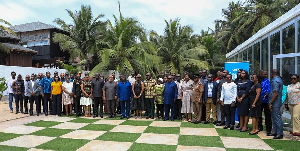 Participants of the event in a group picture
Participants of the event in a group picture
The Government of Ghana, led by the National Disaster Management Organization (NADMO) and supported by the United Nations, has started the process
to establish a suitable framework for effective management of climate and disaster risk reduction (DRR) in Ghana.
Findings and recommendations from a national and local capacity assessment conducted in 2022 to evaluate the country’s risk management capabilities were presented on August 13, 2024, in Accra.
The report emphasizes the need for robust preparedness and response plans in key areas like agriculture, energy, social protection, the environment, water and sanitation.
It also urges stakeholders to integrate lessons learned and take actions to address the uneven distribution of climate impact, recognizing that the consequences of climate change are more severe for some communities than others, and ensuring that no one is left behind.
At the opening session of the event, the Director General of NADMO, Eric Nana Agyemang Prempeh said the findings will inform the development of the National DRR Strategy, “a key requirement for the member states of the United Nations, especially those who commit to the implementation of the provisions in the Sendai Framework of Action, 2015-2030."
He further called on stakeholders, especially the UN system, to assist NADMO in coordinating the implementation of the recommendation.
The UN Resident Coordinator, Charles Abani, emphasized the importance of Ghana’s vision of self-resilience, noting that the UN’s support is rooted in prevention principles.
He called for collaborative efforts to integrate the findings into existing policies, programs, and projects to strengthen DRR and climate adaptation in Ghana.
Mr. Abani stressed the need for government investment in the Pwalugu multipurpose dam to control flooding and support livelihoods.
The assessment in 2022 was under the leadership of NADMO, in close collaboration with the Office of the UN Resident Coordinator in Accra, with the support of the UN system in Ghana and the Capacity for Disaster Reduction Initiative (CADRI) Partnership, an alliance of humanitarian and development partners working to strengthen DRR capacities.
The report is a significant milestone in the shared journey between the UN and the government towards strengthening Disaster Risk Management (DRM), DRR, and Climate Change Adaptation capacities in Ghana.
The findings and recommendations stem from extensive consultations with 23 central institutions, 52 local institutions/departments, 2 civil society organizations, 1 private sector organization, 3 multi and bilateral partners, and 1 university, as well as engagement with national, regional, district, and community levels.
Following this report, the next step for the government will be to develop an implementation plan, prepare a capacity development plan, ensure the dissemination of the results and recommendations at the regional and district levels, develop the DRR Strategy and Action plan, and harmonize the planned recommendations with international and national development frameworks.